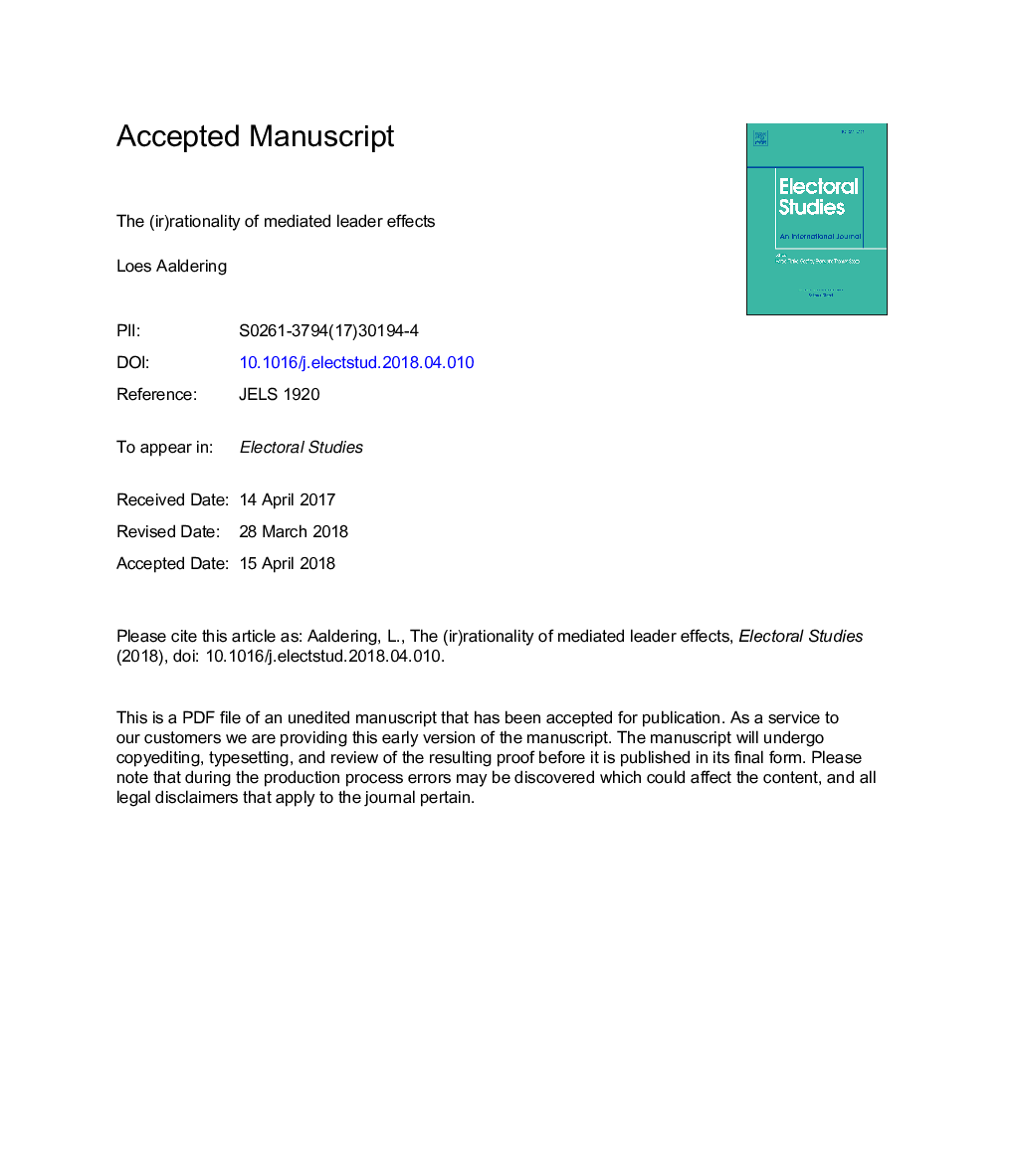| کد مقاله | کد نشریه | سال انتشار | مقاله انگلیسی | نسخه تمام متن |
|---|---|---|---|---|
| 7463144 | 1484939 | 2018 | 40 صفحه PDF | دانلود رایگان |
عنوان انگلیسی مقاله ISI
The (ir)rationality of mediated leader effects
ترجمه فارسی عنوان
عقلانیت (و) اثرات رهبر واسطه
دانلود مقاله + سفارش ترجمه
دانلود مقاله ISI انگلیسی
رایگان برای ایرانیان
کلمات کلیدی
رهبران حزب، رسانه ها، رفتار انتخاباتی، پنل اطلاعات، تجزیه و تحلیل محتوا، مدرن، رفتار رایج منطقی،
ترجمه چکیده
بحثی پر جنب و جوشانه وجود دارد که آیا تصمیمات رای گیری براساس ارزیابی رهبران تهدیدی برای دموکراسی در نظر گرفته می شود، چرا که این مدت طولانی تصور می شود که رفتار تصمیم گیری غیر منطقی را تشکیل می دهد. شواهد تجربی نشان می دهد که اثرات رهبری لزوما بیان بی رویه بودن است اخیرا نصب شده است، هر چند شک و تردید به سمت اثرات رهبر باقی می ماند مقاوم به خصوص، در نظر گرفتن رأیدهندگان تحت تاثیر رسانه ها از رهبران حزب. در این مقاله برخی از مفاهیم اصلی «بی رویه بودن اثرات رهبر»، با بررسی شرایط تحرک میان رهبران بر اساس چهار ویژگی رای دهندگان، آموزش، علاقه سیاسی، فاصله ایدئولوژیک به حزب رهبر و بدبینی سیاسی، بررسی شده است. دو مجموعه داده ترکیبی هستند: یک تحلیل محتوای دستی از تصاویر رهبری در پوشش تلویزیونی و یک پانل داده پنج ماهه در چهار ماه قبل از انتخابات پارلمان 2012 در هلند. نتایج مخلوط شده اند: یکی از این دست، تحت تأثیر تصاویر رهبری از طریق رسانه ها، میانجی نیست که رای دهندگان ناتوان از درک سیاست ها باشند، در حالی که ملاحظات ایدئولوژیک و دیگر نگرش های سیاسی به طور کامل از روند تصمیم گیری مستثنی نیستند، اما از سوی دیگر، اثرات رهبر متکی بر قوی ترین رقیب برای کسانی است که در مورد سیاست کمترین توجه را دارند. بنابراین، شواهد تجربی می تواند در هر دو طرف بحث مطرح شود، و بنابراین، به طور قطعی مسئله را حل نمی کند که چگونه اثرات رهبر میانجی در رابطه با غیر منطقی بودن تصمیم رای گیری باید در نظر گرفته شود.
موضوعات مرتبط
علوم انسانی و اجتماعی
علوم اجتماعی
جغرافیا، برنامه ریزی و توسعه
چکیده انگلیسی
There is a lively debate whether to consider vote decisions based on leader evaluations a threat to democracy, as this has long been assumed to constitute irrational decision-making behavior. Empirical evidence indicating that leader effects are not necessarily expressions of irrationality has recently mounted up, though skepticism towards leader effects remains resilient especially when considering voters being influenced through media coverage of party leaders. This paper studies some of the core assumptions of the 'irrationality of leader effects' thesis, by testing the conditionality of mediated leader effects based upon four voter characteristics: education, political interest, ideological distance to the leader's party and political cynicism. Two datasets are combined: a manual content analysis of leadership images in television coverage and a five-wave panel-dataset in the four months preceding the 2012 Parliamentary elections in the Netherlands. The results are mixed: one the one hand, being influenced by leadership images through the media is not a shortcut for voters who are incapable of understanding politics, while ideological considerations and other political attitudes are not completely excluded from the decision-making process, but, on the other hand, mediated leader effects are found to be strongest for voters who care least about politics. Thus, the empirical evidence can be brought to bear on both sides of the discussion, and, hence, does not conclusively settle the issue how mediated leader effects must be considered in relation to the irrationality of the vote decision.
ناشر
Database: Elsevier - ScienceDirect (ساینس دایرکت)
Journal: Electoral Studies - Volume 54, August 2018, Pages 269-280
Journal: Electoral Studies - Volume 54, August 2018, Pages 269-280
نویسندگان
Loes Aaldering,
